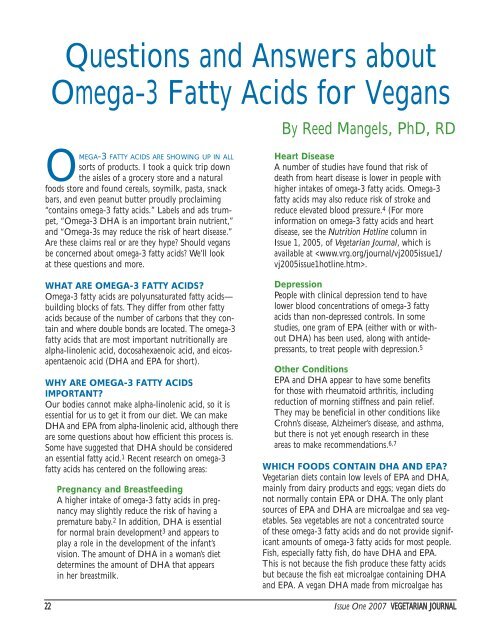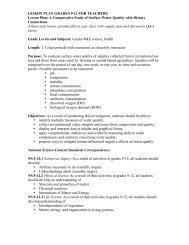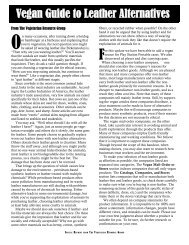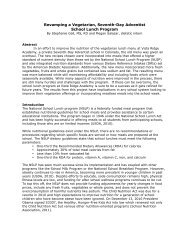Vegan Thickeners - The Vegetarian Resource Group
Vegan Thickeners - The Vegetarian Resource Group
Vegan Thickeners - The Vegetarian Resource Group
Create successful ePaper yourself
Turn your PDF publications into a flip-book with our unique Google optimized e-Paper software.
Questions and Answers about<br />
Omega-3 Fatty Acids for <strong>Vegan</strong>s<br />
By Reed Mangels, PhD, RD<br />
OMEGA-3 FATTY ACIDS ARE SHOWING UP IN ALL<br />
sorts of products. I took a quick trip down<br />
the aisles of a grocery store and a natural<br />
foods store and found cereals, soymilk, pasta, snack<br />
bars, and even peanut butter proudly proclaiming<br />
“contains omega-3 fatty acids.” Labels and ads trumpet,<br />
“Omega-3 DHA is an important brain nutrient,”<br />
and “Omega-3s may reduce the risk of heart disease.”<br />
Are these claims real or are they hype? Should vegans<br />
be concerned about omega-3 fatty acids? We’ll look<br />
at these questions and more.<br />
WHAT ARE OMEGA-3 FATTY ACIDS?<br />
Omega-3 fatty acids are polyunsaturated fatty acids—<br />
building blocks of fats. <strong>The</strong>y differ from other fatty<br />
acids because of the number of carbons that they contain<br />
and where double bonds are located. <strong>The</strong> omega-3<br />
fatty acids that are most important nutritionally are<br />
alpha-linolenic acid, docosahexaenoic acid, and eicosapentaenoic<br />
acid (DHA and EPA for short).<br />
WHY ARE OMEGA-3 FATTY ACIDS<br />
IMPORTANT?<br />
Our bodies cannot make alpha-linolenic acid, so it is<br />
essential for us to get it from our diet. We can make<br />
DHA and EPA from alpha-linolenic acid, although there<br />
are some questions about how efficient this process is.<br />
Some have suggested that DHA should be considered<br />
an essential fatty acid. 1 Recent research on omega-3<br />
fatty acids has centered on the following areas:<br />
Pregnancy and Breastfeeding<br />
A higher intake of omega-3 fatty acids in pregnancy<br />
may slightly reduce the risk of having a<br />
premature baby. 2 In addition, DHA is essential<br />
for normal brain development 3 and appears to<br />
play a role in the development of the infant’s<br />
vision. <strong>The</strong> amount of DHA in a woman’s diet<br />
determines the amount of DHA that appears<br />
in her breastmilk.<br />
Heart Disease<br />
A number of studies have found that risk of<br />
death from heart disease is lower in people with<br />
higher intakes of omega-3 fatty acids. Omega-3<br />
fatty acids may also reduce risk of stroke and<br />
reduce elevated blood pressure. 4 (For more<br />
information on omega-3 fatty acids and heart<br />
disease, see the Nutrition Hotline column in<br />
Issue 1, 2005, of <strong>Vegetarian</strong> Journal, which is<br />
available at .<br />
Depression<br />
People with clinical depression tend to have<br />
lower blood concentrations of omega-3 fatty<br />
acids than non-depressed controls. In some<br />
studies, one gram of EPA (either with or without<br />
DHA) has been used, along with antidepressants,<br />
to treat people with depression. 5<br />
Other Conditions<br />
EPA and DHA appear to have some benefits<br />
for those with rheumatoid arthritis, including<br />
reduction of morning stiffness and pain relief.<br />
<strong>The</strong>y may be beneficial in other conditions like<br />
Crohn’s disease, Alzheimer’s disease, and asthma,<br />
but there is not yet enough research in these<br />
areas to make recommendations. 6,7<br />
WHICH FOODS CONTAIN DHA AND EPA?<br />
<strong>Vegetarian</strong> diets contain low levels of EPA and DHA,<br />
mainly from dairy products and eggs; vegan diets do<br />
not normally contain EPA or DHA. <strong>The</strong> only plant<br />
sources of EPA and DHA are microalgae and sea vegetables.<br />
Sea vegetables are not a concentrated source<br />
of these omega-3 fatty acids and do not provide significant<br />
amounts of omega-3 fatty acids for most people.<br />
Fish, especially fatty fish, do have DHA and EPA.<br />
This is not because the fish produce these fatty acids<br />
but because the fish eat microalgae containing DHA<br />
and EPA. A vegan DHA made from microalgae has<br />
22 Issue One 2007 VEGETARIAN JOURNAL

















